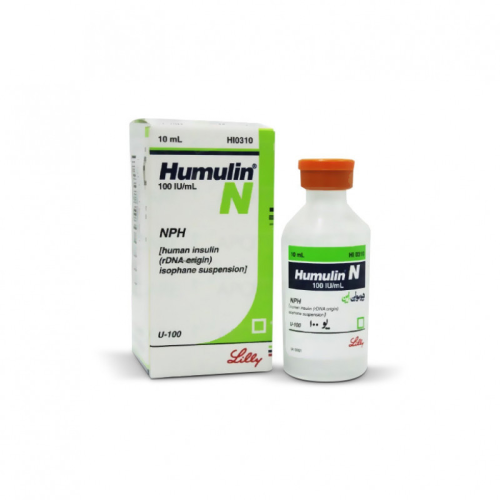Humulin N 100IU (Vial)
- Brand: Lilly
- Product Code: Humulin N 100IU (Vial)
- Availability: In Stock
-
$62.00
CLASSIFICATION
Hormone and Synthetic Substitute / Antidiabetic Agent
ACNE
No
WATER RETENTION
No
HBR
No
HEPATOTOXICITY
No
AROMATIZATION
No
MANUFACTURER
Lilly
WAREHOUSE
International Warehouse 2
SUBSTANCE
Insulin
,
Insulin is a potent anabolic hormone produced naturally by all humans, playing a vital role in overall health and bodily functions. For those with diabetes, insulin is often administered externally, and some athletes may use it to promote lean muscle growth. However, using insulin without medical supervision can be risky and potentially life-threatening, so extreme caution is necessary.
Even though insulin is naturally made by the body, exogenous insulin first emerged in the 1920s. Initially derived from the pancreases of dogs and later from cattle and pigs, concerns about purity were prevalent. Nonetheless, the lifesaving effects of exogenous insulin made it highly valued, especially since untreated diabetes can be fatal. By the 1970s, purity issues had largely been resolved, leading to the introduction of synthetic insulin in 1975 by Ciba. This was further refined in 1982 with the launch of Humulin-R, which is an exact replica of human insulin and received FDA approval.
Insulin Functions & TraitsProduced by the pancreas, insulin is classified as a peptide hormone responsible for the management and utilization of glucose, amino acids, and fatty acids, as well as preventing the breakdown of glycogen, fats, and proteins.
Diabetic individuals may require insulin for two main types of diabetes: Type I, where the body doesn’t produce sufficient insulin, and Type II, where insulin is produced but not effectively recognized by cells, often linked to obesity.
Insulin positively influences the liver to convert glycogen into glucose while inhibiting the conversion of non-carbohydrates into glucose. It also facilitates glucose absorption in cells, promoting muscle growth. Elevated insulin levels can enhance protein synthesis, increase bone density, and boost the production of Insulin-Like Growth Factor-1 (IGF-1), another anabolic hormone similar to insulin.
Additionally, insulin has the ability to raise levels of Luteinizing Hormone (LH) and Follicle Stimulating Hormone (FSH), which can contribute to increased testosterone production, although the effect is not particularly strong.
Effects of InsulinThe primary role of insulin across all types of diabetes is regulating blood sugar levels. Its strong anabolic and anti-catabolic effects can also benefit athletes, but for those without diabetes, using exogenous insulin can lead to significant fat gain and serious health risks if not properly managed.
Despite the dangers, some athletes find the anabolic benefits of insulin appealing, provided they manage their body fat carefully. High levels of insulin can inhibit fat burning, requiring disciplined dietary choices to ensure that glucose and protein are stored in muscles rather than fat tissues. For optimal anabolic effects, insulin is best taken immediately after intense weight training, accompanied by food.
Insulin can help build considerable lean muscle mass in a short time, and with a well-structured plan, it’s possible to control fat gain. The combination of anabolic steroids and Human Growth Hormone (HGH) is often recommended in performance contexts, as this strategy can further enhance muscle growth and aid in fat management.
Side Effects of InsulinPossible side effects of insulin primarily involve hypoglycemia. For diabetics, this issue can usually be managed through proper dosing, but it poses a risk in performance use. Hypoglycemia, marked by low blood glucose levels, can lead to severe consequences if not addressed.
Symptoms of hypoglycemia include:
If these symptoms occur, immediate consumption of fast-acting carbohydrates, such as candy or sugary drinks, is crucial. Regardless of symptoms, it’s advised not to sleep after administering insulin, as falling asleep could lead to a dangerous hypoglycemic state. In severe cases, medical attention is necessary, which is why administering insulin alone is not recommended.
While hypoglycemia can often be corrected easily, it can also lead to serious conditions like diabetic coma, with some fatalities reported from improper insulin use in performance contexts.
Other potential side effects include allergic reactions, which may manifest as swelling, itching, or irritation at the injection site—though these are rare. More severe allergic responses can include rashes, shortness of breath, rapid heartbeat, wheezing, or drops in blood pressure, requiring immediate medical attention.
Repeated injections in the same area can also lead to localized fat accumulation, so it’s essential to rotate injection sites.
Insulin AdministrationThe dosage of insulin for diabetes varies based on individual needs, with no universal standard applicable.
For performance enhancement, multiple insulin forms are available, including short-acting and long-acting options. Fast-acting insulins like Humulin-R, Humalog, and Novolog are preferred for athletes.
Humalog begins to take effect within approximately 15 minutes, with peak levels at 30 to 90 minutes and a duration of 3 to 5 hours. Novolog and Humulin-R act similarly, but they are slightly slower, with Humulin-R being the slowest. While Novolog may be hard to obtain for some athletes, Humulin-R is readily available over the counter.
A common performance-enhancement dosage is about 1 IU per 10 pounds of body weight. First-time users should start lower, at 1 IU post-workout, gradually increasing by 1-2 IU per day until a comfortable dosage is found. If symptoms of hypoglycemia arise that are difficult to reverse, users should lower their insulin dosage accordingly.
The best time to inject insulin is immediately after weight training, with a minimum of 100g of carbohydrates recommended. Consuming solid and liquid carbohydrates about 15 minutes post-injection, along with around 40–50g of protein, is ideal.
While the minimum carb intake is 100g post-injection, some individuals may require more, especially as their doses increase. It’s important not to use excessive insulin, and users should start with lower doses, increasing only as necessary.
Always have fast-acting carbohydrates readily available to quickly address any hypoglycemic symptoms. Responsible users never inject insulin without having adequate carbohydrates on hand. Following the ingestion of carbohydrates, individuals should plan to eat another meal soon afterward.
Insulin ReviewsInsulin is crucial for health and bodily functions. As a performance aid, it can significantly assist in muscle building, though its use carries risks. Many may struggle to manage body fat while using it, and most individuals won’t need it for their fitness goals, often achieving better long-term results by avoiding it altogether.
However, it remains popular among competitive bodybuilders, both amateur and professional, who might combine it with other hormones. Regular gym-goers using performance enhancers often find that insulin leads to unwanted fat gain.
Some athletes outside of physique sports use insulin because it is not detectable in drug tests, often in small doses alongside HGH and minimal testosterone or thyroid medications to navigate testing protocols.

